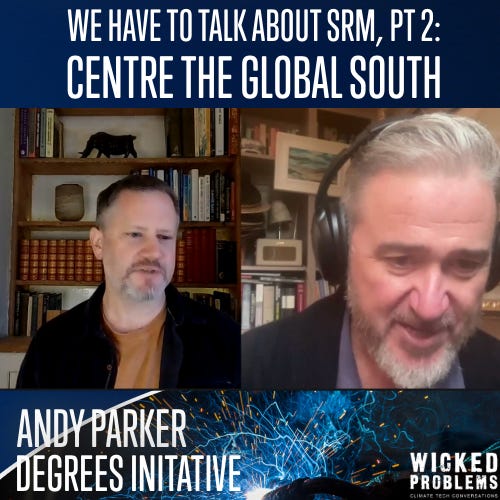It’s the best of times, it’s the worst of times. I don't know about you, but the whipsaw between good news, bad news and really, really dire news is…a lot. And it’s not going to get any better any time soon.
Outro
Let us not talk falsely now. The hour’s getting late.
Good News, Bad News, OMG WAGD News
But we have to take the good with the bad. And last week we had some really good stuff, talking with our friends Freya Pratty from Sifted and Ben Kilbey from (amongst other things) Electric Vehicles UK, along with some new first time guests like Sam Fankhauser from Oxford Smith School and Ben Nelmes from New Automotive.
Because there are a lot of good things that are happening here in the UK. EV sales are up. Octopus Energy is starting to look like the UK national champion for the energy transition. And Chris Stark over the Department of Energy Security and Net Zero is navigating a bunch of tough dilemmas that need to be resolved if the UK is going to achieve its goal of clean power by 2030. He does so with a smile on his face that makes you think, maybe?
On the other side of the Atlantic, however, we spoke yesterday with Dana R. Fisher of American University, who has a front row seat for the Autodafé of climate science, funded by the US government, currently underway.
Most things, however, just hit in the grey area, where it's not really clear whether it's good or bad. Motives can be murky. In the Financial Times today, in an interview with the CEO of BMW, the article claimed “slowing growth” in the EV market, which I'm not sure is entirely accurate if you consider it in the context of whether other things are growing in the car market. The headline suggested BMW was changing focus to petrol cars as opposed to the plug in hybrids and battery electric vehicles that make up like 24 percent of their sales. But dig into a little bit and you realise that not only is the article actually saying that BMW is well positioned to survive the roller coaster of EV adoption in the US plus tariff mess there. The piece also refers to the company’s Neue Klasse, this whole set of advances that BMW rolled out last year. BEVs with a 400 mile range without needing a charge, and which in 12 minutes can be charged to go an extra 200 miles. Which would solves a lot of the problems that have held back EV adoption.
Or the news about Drax, which takes biomass [aka ‘wood’] and burns it to make electricity.
UK Government announced this morning Drax’s CfD was being renewed at an eye-watering price per MWh, to the tune of £500 million per year between now and 2030. Cue online outrage. But again, if you dig in a little bit onto the detail, you realise that, well, actually the there are new conditions: what kind of wood, how it's going to be sourced, reducing the upper limit of how reliant the UK grid is going to be on Drax's biomass through 2030, in fact cutting it in half.
Because it'd be pretty to think you could just switch off anything we don't like. If it's 4 percent of the electricity generation in this country, which it is, then just turning it off would have consequences.
Which is why, in this parish, we want to try to get past the initial emotional reaction to things and add a little bit of data. There's plenty of vibe merchants out there, and we don't need to be another of them.
Which means we think things like Rupert Reed's Climate Majority Project - an attempt to steer the conversation more towards adaptation necessary to deal with the climate change that's going to happen no matter what.
Side Note: CMP have a conference coming up in March at Limehouse in London. I’m going along, and if you work in climate tech or energy I’d encourage you to check it out.
Because when you take all that into account, we're still falling well short of what needed to be happening to keep things globally under 2C degrees. Never mind 1.5. Which seems to mean we’re staring into the cascading loss of sea ice and glaciers that would lead to tipping points like thawing a big chunk of permafrost or shutting down the AMOC conveyor belt that moves heat around the oceans or the uninhabitability of a big swathe of the area around the equator.
Which is leading people to think things that previously were unthinkable. Like SRM - aka solar radiation modification, aka ‘solar geoengineering’.
Last week, to a lot of online reaction, not all of it good, we spoke to Kelly Wanser from Silver Lining, a non profit that advocates for research in this area. Not everyone was happy we talked about the subject. Understandably people are concerned, with good reason. Humanity doesn't have a great track record of avoiding being reckless or selfish and making decisions here in the so called global north that will definitely hurt other people — but we do it anyway.
Whether it's like small island states that will go under the waves in our lifetimes because of. These effects and at the International Court of Justice hearing lawyers for big nations basically saying, “oh, well, that's sad Sorry about that. I don't think we can do about it though But here here's some tickets to get some immigration for a couple thousand of you anyway to come to Australia but in exchange, we're gonna need your fishing rights and Mineral rights for the undersea stuff.”
Or telling India and China, “sorry. No, you cannot have the standard of living that fossil fuels enabled The West to have.” Weirdly, not everyone is super excited with that kind of trade off.
So if we’re going to feel obliged to look seriously at SRM - which is not the same as endorsing it - at the very least there should be ground rules: Insisting that the science done by and for researchers in the global south should be given privileged position in conversations about whether to do that research, about how to weigh potential costs and benefits, how to govern any of that stuff, how to even talk about it. Because places like Latin America, or South Africa, or Pakistan tend to have communities least able to cope with any potential negative outcomes. Andy Parker, Founder and CEO of the Degrees Initiative based in Bristol in the UK, has doing exactly that for 16 years - we think it made for an interesting chat.
And in May, Degrees Initiative is convening the world’s largest conference to date on SRM, in Cape Town, South Africa. It might well reset the global conversation on the science, the economics, and the geopolitics of SRM.
If you’re enjoying these conversations, do please share it, leave a rating and review on the platform of your choice, and send us feedback here at wickedproblems.earth.
Outro List
Chapters
00:49 Current Climate Challenges and Innovations
01:39 Global Perspectives on Climate Science
05:14 The Ethics of Solar Geoengineering
10:05 Interview with Andy Parker
19:22 The Degrees Initiative and Global South
23:45 Potential Risks and Considerations of SRM
26:32 Potential Side Effects of Not Using SRM
26:57 Security Implications and Uncertainties
27:40 Degrees Initiative: Research and Support
28:40 Fictional Scenarios and Real Concerns
30:03 Termination Shock and Climate Impact
37:01 Governance Challenges of SRM
40:22 Mainstream Media and SRM Discourse
43:15 Popular Culture's Take on SRM
45:50 Final Thoughts and Future Directions
48:34 Conclusion and Contact Information














